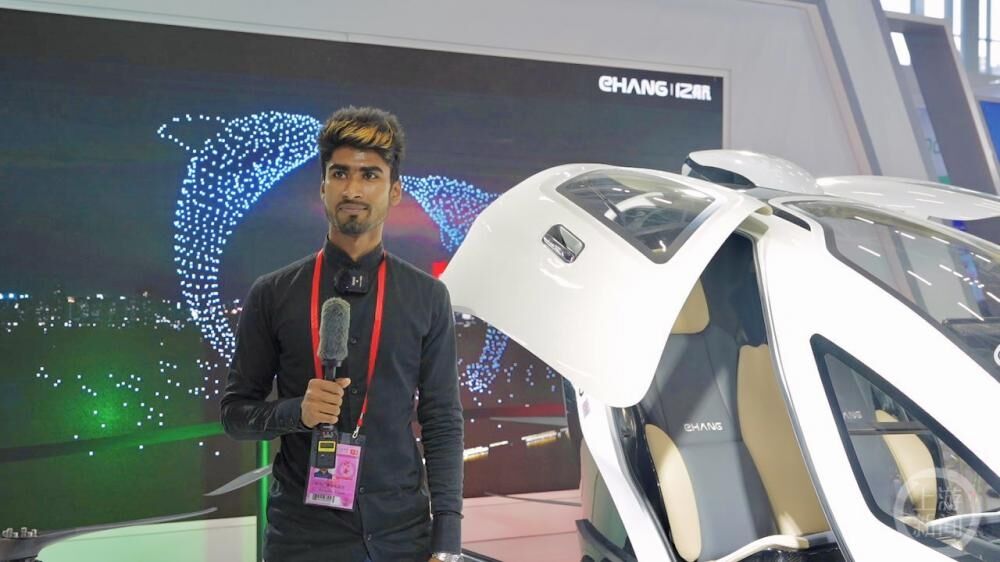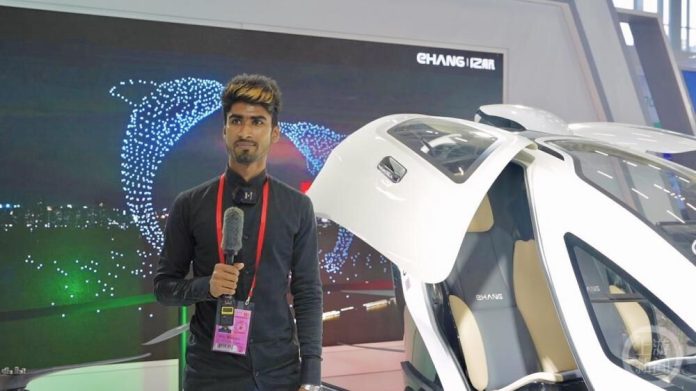Zhang Hao (NISHADUR), currently studying at Guangdong University of Foreign Studies, is a Bangladeshi student who has excelled in learning Chinese and has been awarded a scholarship. He came to China, a place he had longed to visit, after receiving training at the Confucius Institute in Bangladesh.
On August 31st, an Upstream News reporter visited Guangdong University of Foreign Studies and met Zhang Hao, who despite being a foreigner, could fluently express himself in Mandarin. Along the way, he greeted many college students who recognized him as their good friend, saying with a smile, “I never feel lonely in China.”

Growing up as a Bangladeshi student using “Made-in-China” products
“Zhang Hao is not a name I chose for myself; it was given to me by my Chinese teacher at the Confucius Institute. Zhang is my surname, and ‘Hao’ means vast,” explained Zhang Hao about the origin of his name. When talking about his reasons for studying at the Confucius Institute, Zhang Hao mentioned that he had been using Chinese products since childhood and had developed a longing for China. Additionally, studying Chinese language in his local area, he found out that many people from Bangladesh come to China for further studies. His elder brother from the neighborhood was also one of the pioneers.
“When I was a child, I used electronic products made in China, such as mobile phones. In our country, we mostly use brands like Huawei, Xiaomi, Vivo, as well as computers, LCD screens, refrigerators, and many daily necessities. These products have good quality and low prices, which are very suitable for ordinary people in developing countries like ours,” Zhang Hao expressed. He further added that in recent years, many large-scale projects in Bangladesh have been undertaken by Chinese companies, including power plants, airports, railways, bridges, ports, tunnels, and subways.
Public information shows that in September of this year, the first phase of the Dhaka Elevated Expressway project, invested, constructed, and operated by Chinese enterprises, was completed. Bangladeshi Prime Minister Sheikh Hasina attended the ceremony and praised the project as a new milestone in Bangladesh’s transportation infrastructure, which will alleviate the traffic pressure in the capital city and inject more impetus into the country’s economic development.
In July of this year, the inauguration ceremony for Bangladesh’s first modern large-scale sewage treatment plant, Dasherjangi Sewage Treatment Plant, was held. The project started construction in August 2017 and was financed by preferential loans from the Chinese government and financing from the Export-Import Bank of China. China Energy Engineering Corporation Chengdu Survey & Design Research Institute was responsible for the construction and operation. Prime Minister Sheikh Hasina highly praised China’s implementation of the “Belt and Road” initiative, which has helped improve Bangladesh’s ecological environment and raise the living standards of local people.
In July 2022, the then Bangladeshi Ambassador to China, Mahbub Uz Zaman, stated that when Bangladesh joined the “Belt and Road” initiative in 2016, it had a positive attitude towards it. Bangladesh believes that the “Belt and Road” initiative can support its goal of becoming a middle-income country by 2021 and a developed country by 2041, promoting sustainable development and mutual prosperity between the two countries.
Studying in China: Many memorable “first times”
Zhang Hao has captured numerous photos and videos since he came to China, stored on his phone and computer. From the first time playing basketball with friends at Tianhe Sports Center, to the first time enjoying hot pot and barbecue with classmates, riding a high-speed train, visiting the mountains and schools in Shaoguan, experiencing the vertical track in Chongqing, exploring the charm of ancient architecture in Shanxi, and celebrating the Chinese New Year with Chinese classmates at their homes.
“I am an outgoing person, even a bit lively. I have made many new friends in China and occasionally stay at their homes. Many times, I feel like I am also a Chinese person; that feeling is very comfortable,” Zhang Hao reminisced about his two years in Guangzhou, which were incredibly happy and fulfilling in his 24-year-old life journey.

On July 24th, Zhang Hao was invited to become an “International Experience Ambassador” at Guangdong University of Foreign Studies and visited Boluo County, Huizhou City, known for its beautiful scenery throughout the four seasons.
Food is of paramount importance to the people. At the foot of Luofu Mountain, in the clay kiln house of Bolang Villa, Zhang Hao observes the process of making oven-roasted chicken immersed in marinade, waiting for it to be flavored and wrapped in tin foil before being placed in the clay kiln and roasted. The master chef of the oven-roasted chicken tells him that the firewood used for burning the kiln is deliberately selected from the dried lychee wood at the foot of Luofu Mountain. The lychees from Luofu Mountain are fresh and delicious, and their wood contains a natural oil. When burned, it releases a rich aroma that infuses the oven-roasted chicken, adding a touch of natural sweetness.
In addition to enjoying the delicious oven-roasted chicken, Zhang Hao also had an immersive experience in making Hakka-style tofu pudding, a representative snack of Luofu Mountain. First, soybeans are ground into soy milk using a stone mill. Then, the raw soy milk is poured into a pot and boiled, removing the foam. Afterwards, a formula consisting of slightly less than half a bowl of cold water is slowly added while stirring gently in one direction with a spoon. Once the soy milk coagulates, a bowl of sweet and tasty tofu pudding is ready.
Uncovering the packaging film, Zhang Hao scoops up a spoonful and puts it into his mouth. The delicate and smooth texture of the tofu pudding leaves a deep impression on him. He realizes, “This small bowl of tofu pudding carries the essence of the mountains and rivers. At that moment when I tasted it, I probably understood that this delicacy is a gift from nature and also a testament to the wisdom of the Chinese people.”
During this trip, Zhang Hao also tried wearing traditional costumes at the Ge Hong Museum in Luofu Mountain and followed the guide to search for rare Chinese medicinal herbs, while listening to the legendary stories of Ge Hong’s medical practice and saving lives. On an exhibit board, Zhang Hao read a passage from Ge Hong’s “Emergency Prescriptions Kept Behind the Elbow,” which detailed the steps of extracting juice from Artemisia annua. It allowed him to experience the unique charm of traditional Chinese medicine culture.
“I came to Huizhou Boluo to promote local culture, allowing more people, especially foreigners, to experience the charm of these cuisines, folk customs, traditional Chinese medicine, and architecture through videos or by visiting directly,” Zhang Hao said. Given the opportunity, he would continue to introduce Guangdong and China to more people. “Only when you have been here, experienced it, will you understand the friendliness of the Chinese people and the profoundness of Chinese culture.”
Zhang Hao said, “I am grateful to China and grateful for the teachers and friends I have met here. When I graduate, I will continue to work hard to stay in China and pursue a career related to my business studies.”









